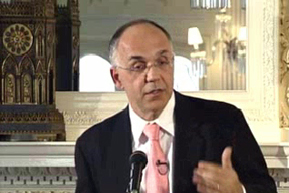The Campagna-Kerven Lecture Series on Modern Turkey
Henri J. Barkey: Where Have Old Friends Gone? U.S.-Turkish Relations Since the Iraq War

Click here to watch Henri J. Barkey speak on BUniverse.
Henri J. Barkey, chair of the department of international relations at Lehigh University, gives the 2008 Campagna-Kerven Lecture on Modern Turkey,the 13th in the series. He discusses a changing international systembeginning with the end of the Cold War, new perceptions between theUnited States and Turkey, and different national interest issues withineach country.
Barkey, a respected political scientist, a formergovernment official, and a leading authority on Turkey, predicts that thenext president of the United States will have to confront the issue ofTurkey. He says that currently only 9 percent of the people of Turkeyhave a favorable opinion of the United States, but at the end of theClinton era, more than half had a positive view. This is the result ofa changing international system beginning with the end of the Cold War,new perceptions between the countries after September 11, 2001,and different national interest issues. These are related, he says, are,in fact, inseparable. Turkey became more important to the United Statesafter the end of the Cold War;the country was an island of stability in the area. Turkey had beenpretty much a secular country, but at this time Kurdish nationalism andreligious parties and forces began to emerge.
Domestic policies now inboth countries play an important role in their foreign policies.Northern Iraq, with its large population of Kurds, is a big problemtoday between Turkey and the United States. If the Kurds in Iraq tryfor independence, Turkey fears that Turkish Kurds will follow. TheKurdish genie is out of the bottle, Barkey says, let out by the UnitedStates, which has brought an independent Kurdish state closer toreality by initiating the Iraq War. The ironic thing, he says, is thatTurkey and the United States want the same thing — a united Iraq as abuffer to Iran. He predicts a looming new crisis: the Turkish SupremeCourt will probably ban the AKP, Turkey’s pro-Western ruling politicalparty, which advocates a liberal market economy and Turkish membershipin the European Union, in next few months, putting the next Americanpresidential administration in a quandary.
The Campagna-KervenLecture Series presents leading experts — journalists, scholars,business leaders, literary figures, and creative artists — on modernTurkey, as well as promising younger scholars and intellectuals. Theseries, begun in 1996, fosters informed public debate and seeks toimprove the public’s knowledge of Turkish society and politics.
April 16, 2008, noon
The Castle
About the speaker:
HenriJ. Barkey is the Bernard L. and Bertha F. Cohen Professor and chair ofthe department of international relations at Lehigh University. He is amember of the Council on Foreign Relations and has worked with policyplanning for the U.S. State Department. He was awarded a Fulbright in1990 and was named the Woodrow Wilson Center’s Public Policy Scholar in 2007. He has published numerous articles on Turkey and Europe, as well as the books European Responses to Globalization: Resistance, Adaptation and Alternatives, and Turkey’s Kurdish Question.
Comments & Discussion
Boston University moderates comments to facilitate an informed, substantive, civil conversation. Abusive, profane, self-promotional, misleading, incoherent or off-topic comments will be rejected. Moderators are staffed during regular business hours (EST) and can only accept comments written in English. Statistics or facts must include a citation or a link to the citation.